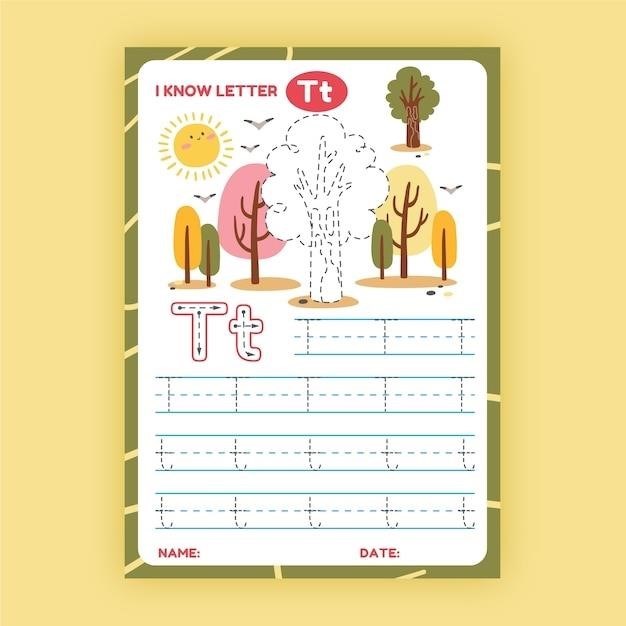Understanding the MAP Test
The MAP Test, or Measures of Academic Progress, is a standardized assessment used to measure student growth and achievement in various subjects, including reading, math, language usage, and science․ It is a computer-adaptive test, meaning the difficulty of the questions adjusts based on the student’s performance․ The MAP Test is often used in schools across the United States to track student progress, guide instruction, and identify areas for improvement․
What is the MAP Test?
The Measures of Academic Progress (MAP) Test is a standardized assessment widely used in schools across the United States․ It’s designed to measure student growth and achievement in a variety of subjects, including reading, math, language usage, and science․ The MAP Test is a computer-adaptive assessment, meaning the difficulty of the questions adjusts based on the student’s performance․ This allows for a more personalized and accurate assessment of individual student progress․ The MAP Test is a valuable tool for teachers and educators to track student growth, guide instruction, and identify areas where students might need extra support․
Why Practice for the MAP Test?
Preparing for the MAP Test can bring numerous benefits for your child, contributing to their overall academic success․ Practice helps familiarize them with the test format, including the types of questions and the computer-adaptive nature of the assessment․ This familiarity can reduce anxiety and boost confidence during the actual test․ Moreover, practice exposes your child to the specific concepts and skills assessed in the MAP Test, reinforcing their learning and helping them identify areas where they might need extra attention․ By engaging in practice sessions, your child develops essential test-taking strategies, such as time management, pacing, and careful reading of questions․ This, in turn, can lead to improved performance and higher scores on the MAP Test, ultimately contributing to their academic progress․
MAP Test Practice for 1st Grade
Preparing your child for the MAP Test can be a rewarding experience․ This section offers valuable tips, resources, and sample questions to help your 1st grader succeed․
Free Sample Questions and Resources
Finding free sample questions and resources can be a great way to get your child familiar with the MAP Test format; Websites like TestPrep-Online offer free practice questions for 1st grade, covering various subjects․ These sample questions can help your child understand the types of questions they might encounter on the actual test․ You can also find free PDF resources online that provide practice tests and sample questions aligned with the MAP Test curriculum․ These resources can help your child build confidence and familiarity with the test content before they take the actual assessment․
Practice Test Formats and Content
The MAP Test for 1st grade is designed to assess a child’s understanding of fundamental concepts in reading, math, language usage, and science․ Practice tests typically focus on key skills like identifying letters and sounds, counting and number recognition, basic addition and subtraction, sentence structure, and simple science concepts․
The test format may include multiple-choice questions, drag-and-drop activities, and even interactive games to make learning engaging․ Understanding the format and content of the practice tests can help your child feel more confident when they take the actual MAP Test․
Tips for Preparing Your Child
Preparing your child for the MAP Test doesn’t have to be stressful․ Start by creating a positive and supportive learning environment at home․ Encourage your child to practice basic skills through fun activities like reading aloud together, playing board games that involve counting and problem-solving, and engaging in age-appropriate science experiments․ Make sure your child gets enough sleep, eats healthy meals, and has time to relax and play․ Focus on building confidence and a love for learning rather than just memorizing facts․ Remember, the goal is to help your child feel prepared and excited about the test, not overwhelmed․
MAP Test Subjects
The MAP Test assesses student understanding in core subjects, including reading, math, language usage, and science․
Reading
The MAP Test’s reading section evaluates a first grader’s ability to comprehend and analyze text, identify key details, and make inferences․ Students will encounter passages of varying lengths and complexities, requiring them to demonstrate their understanding through multiple-choice questions․ These questions may focus on identifying the main idea, determining the meaning of vocabulary words within context, or understanding the author’s purpose․ Practice with reading comprehension passages and questions is crucial for preparing first graders for the MAP Test’s reading section․
Math
The MAP Test’s math section for first graders covers a range of foundational math concepts, including number sense, counting, addition, subtraction, basic geometry, and problem-solving․ Students will be presented with multiple-choice questions that assess their ability to solve simple math problems, understand number relationships, and apply mathematical reasoning․ Practice questions will involve recognizing and comparing numbers, performing basic arithmetic operations, identifying shapes, and solving word problems․ It’s essential for first graders to have a strong foundation in these core math concepts to succeed on the MAP Test’s math section․
Language Usage
The Language Usage section of the MAP Test for first graders focuses on assessing their understanding and application of fundamental language skills․ This includes evaluating their knowledge of grammar, punctuation, spelling, vocabulary, and sentence structure․ First graders will encounter questions that require them to identify correct grammar usage, recognize and correct spelling errors, choose the appropriate vocabulary words in context, and demonstrate an understanding of basic sentence construction․ Practice questions will often involve identifying parts of speech, understanding subject-verb agreement, recognizing punctuation rules, and applying knowledge of common spelling patterns․ These skills are essential for developing strong reading and writing abilities, and the MAP Test’s Language Usage section aims to measure a first grader’s proficiency in these areas․
Science
The Science section of the MAP Test for first grade assesses a student’s understanding of basic scientific concepts and their ability to apply scientific reasoning․ First graders will encounter questions that explore topics like life cycles, weather, physical science, and the environment․ They may be asked to identify parts of a plant, explain how weather changes, or recognize basic physical properties of objects․ The focus is on developing a foundational understanding of scientific inquiry, observation, and the ability to draw conclusions based on evidence․ Practice questions might involve matching pictures to scientific terms, identifying patterns in nature, or explaining simple scientific phenomena․ This section aims to gauge a first grader’s curiosity about the natural world and their ability to make connections between scientific concepts and real-life experiences․

Additional Resources
Beyond online practice, consider exploring additional resources to enhance your child’s MAP Test preparation․
MAP Test Practice Websites
Numerous websites offer valuable MAP Test practice resources for 1st-grade students․ These platforms provide a wide range of practice questions, interactive exercises, and engaging activities to help children familiarize themselves with the test format and content․ One such website, TestPrep-Online, offers a comprehensive suite of MAP Test practice materials, including free sample questions and full-length practice tests․ Their website caters to students across various grade levels and provides valuable insights into the test’s structure and scoring system․ Another excellent resource is the official NWEA website, which offers access to a variety of practice materials, including sample questions and test-taking strategies․ These platforms serve as valuable tools for both parents and educators to enhance student preparedness for the MAP Test․
Free Sample Questions PDFs
For parents and educators seeking additional practice resources for 1st-grade students preparing for the MAP Test, free sample questions PDFs are readily available online․ These downloadable PDFs provide a valuable glimpse into the types of questions that students can expect to encounter on the actual test․ They often cover a wide range of topics, including reading comprehension, math skills, and language usage․ By working through these sample questions, children can gain familiarity with the test format, learn new concepts, and identify areas where they may need additional practice․ These PDFs are a convenient and cost-effective way to supplement classroom instruction and enhance students’ overall preparedness for the MAP Test․
MAP Test Practice Apps
In today’s digital age, mobile applications offer a convenient and engaging way for 1st-grade students to practice for the MAP Test․ Numerous apps are available, designed specifically to help children develop essential skills in reading, math, and language usage․ These apps often feature interactive exercises, games, and assessments that align with the MAP Test curriculum․ They provide a fun and interactive learning experience, making practice more enjoyable for young learners․ Some apps even allow parents and educators to track their child’s progress, providing valuable insights into their strengths and areas for improvement․ By incorporating MAP Test practice apps into their learning routine, students can enhance their test-taking skills, boost their confidence, and feel more prepared for the actual assessment․

Benefits of MAP Test Practice
MAP Test practice offers numerous advantages for 1st-grade students, helping them feel prepared, confident, and ultimately achieve better results․
Increased Confidence
One of the primary benefits of MAP Test practice for 1st-grade students is increased confidence․ When children are familiar with the test format, question types, and the general testing environment, they feel less anxious and more prepared․ This familiarity reduces test-taking stress and allows them to focus on demonstrating their knowledge and skills rather than worrying about the unfamiliar․ Confidence is crucial for young learners, as it empowers them to approach challenges with a positive attitude and a belief in their abilities․ By practicing with sample questions and familiarizing themselves with the test structure, 1st-graders can build the confidence needed to perform their best on the actual MAP Test․
Improved Performance
MAP Test practice not only boosts confidence but also leads to improved performance․ By engaging in regular practice sessions, 1st-graders gain a deeper understanding of the tested concepts and skills․ They learn to apply their knowledge in different contexts and develop strategies for tackling various question types․ Moreover, practice helps them identify their strengths and weaknesses, allowing them to focus on areas where they need additional support․ This targeted practice ensures that they are well-prepared to face the challenges of the actual MAP Test and demonstrate their full potential․ The cumulative effect of practice sessions translates into improved scores and a better understanding of the material, setting a strong foundation for future academic success․
Familiarization with Test Format
One of the key benefits of MAP Test practice for 1st-graders is familiarization with the test format․ The computer-adaptive nature of the MAP Test can be daunting for young learners, especially if they haven’t encountered it before․ Practice tests provide a simulated experience, exposing them to the online interface, the types of questions, and the pacing of the test․ This familiarity helps reduce anxiety and allows them to focus on demonstrating their knowledge and skills, rather than struggling with unfamiliar technology or question formats․ By practicing with sample questions and taking full-length practice tests, 1st-graders gain confidence and comfort with the testing environment, leading to a more positive and successful test experience․
Preparing for the MAP Test is crucial for 1st-graders to succeed in demonstrating their academic abilities․ By incorporating practice tests and engaging in targeted activities, parents and educators can equip young learners with the knowledge, skills, and confidence to excel․ Free sample questions, practice tests, and other resources are readily available online and can be effectively used to enhance preparation․ Remember, the goal is not just to achieve a high score, but to foster a love of learning and a positive attitude towards assessments․ With consistent effort and effective preparation, 1st-graders can confidently navigate the MAP Test and showcase their academic potential․



